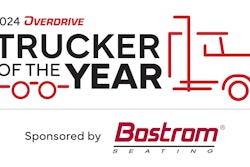FIT FOR THE ROAD
Bobby Andersen, a driver for Miller Truck Lines, has been smoke-free for two years. He considered various stop smoking programs but decided to go cold turkey. “I made myself sick by smoking one cigarette after another until I was about to lose my lunch. That was it. No cravings and no problems since then,” Andersen says.
Quitting cold turkey is one of many ways to kick the habit. Choose one that that works for you or, like Daniel George, a driver for U.S. Xpress says, “I practiced over and over until I got it right.”
The reason smoking is one of the hardest habits to change is because of nicotine, a substance considered as addictive as heroin or cocaine. The incredible physical and emotional dependence a user has on nicotine makes quitting a challenge. Here are some methods available for wannabe quitters.
“Quitting smoking is easy. I’ve done it a thousand times!”
— Mark Twain
Cold turkey
According to an informal Truckers News poll, the second most popular way to quit is to go cold turkey, like Bobby Andersen did. The method requires super-human will power and the ability to suffer severe withdrawal symptoms such as irritability, tiredness and jitteriness. Drink lots of water, breathe deeply when cravings hit and don’t substitute smokes with snacks.
One year after quitting the excess risk of coronary heart disease is half that of a continuing smoker’s.
(US Surgeon General’s Report, 2010, p. 359)
Medication and nicotine replacement therapy
Talk to your doctor about nicotine replacement therapy (patches, nasal spray, gum) and other non-nicotine medications approved by the U.S. Food and Drug Administration.
Important note: Truckers are not allowed to take varenicline tartrate, the generic name of Chantix as well as Champix.
Nicotine gum, nasal spray or patches work by delivering a small dose of nicotine into the body to relieve withdrawal symptoms and help break the physical and psychological addiction.
Ten years after quitting the risk of dying from lung cancer is about half that of a person who is still smoking. The risk of cancer of the larynx (voice box) and pancreas decreases.
(US Surgeon General’s Report, 1990, pp. vi, 155, 165)
Alternative options
Some smokers find relief with hypnosis and acupuncture, both relieve stress and trigger the release of endorphins. Neither are covered by insurance or regulated by FDA.
Motivational therapies
Therapy, self-help books, addiction groups with step programs, smartphone apps, text message services and free online phone counseling can provide the motivation you need to quit smoking. Monetary savings motivates some smokers and others are motivated by the desire to set a good example for their children. Most serious health issues truckers face are made worse or are caused by smoking. Immediate and long-term health gains may motivate a smoker to give up the habit.
Scams and unproven methods
If it seems too good to be true, it probably is. Smokers are easy prey for savvy marketers because of the difficulty and, for some, desperation involved in quitting. Low-voltage lasers, electronic cigarettes, herbs, supplements and magnets — though some have experienced success using them — all come loaded with promises that border on fraud and deception. Be aware of scams and research any method offering easy quitting techniques.
QuitGuide is a free application that was developed by MMG Inc. for the Tobacco Control Research Branch of the National Cancer Institute.







